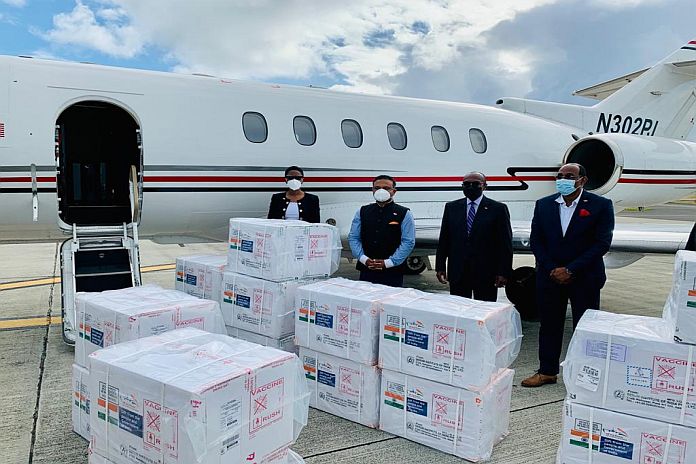By Earl Bousquet
Can COVID-19 vaccine diplomacy deliver enough in time to sustain the Caribbean’s vaccination drive?
With over 2.5 million fatalities worldwide and the global arms race for shoulders raging on at a steady and unrelenting pace, Caribbean citizens have been more than just taking note – they’ve also been taking lines.
Led by ‘first responders’, influenced by influential persons, encouraged by the number of friends seen on television taking the jab and/or galvanized by a COVID-19 related death too close to home for comfort, those without access to devices to register online are quickly heading to the nearest vaccination centers ‘to take the line’.
But it’ll be no easy ride.
The Saint Lucia COVID-19 death rate in the mid-40s and climbing, confirmed cases accelerating towards 4,000 this weekend and the number of active cases nearing 700 on an island of just over 180,000, with the highest COVID-19 spread-and-growth rate in the English-speaking Caribbean and at the top of the US ‘No Fly’ warnings for ‘High Risk’ countries, things don’t look good for the ‘Helen of the West’.
But while the excessive overflow of information about the new vaccines can be confusing, more Caribbean people today are simply opting to err on the side of caution, many who were earlier hesitant now deciding to take the jab.
Several other factors are also at play.
Caribbean grandparents are reminding sons, daughters and grandchildren that vaccinations have always been a part of life in one of the world’s most inoculated regions.
Indeed, most older adults can show a scar or two on their shoulders – like having been branded like slaves with a small hot coin – another sign they’ve been vaccinated from childhood.
But with vaccines rolling-out across the region, people are at the point where they can make the decision – to vax or not to vax – now, later or never. […]
They’ve heard the conspiracy theories, considered the concerns about long-term effectiveness and the pleas to ‘Follow the Science’ and ‘Go with the Numbers’.
All that’s sounds nice…
Yet, if the Saint Lucia example is anything to go by, the numbers and the science don’t paint a bright picture at all.
With 3,000 vaccines initially contributed by Dominica and Barbados and 25,000 more arriving last week from India for the start of this week’s Saint Lucia rollout, the 28,000 Oxford-AstraZeneca doses on hand (at two jabs per person) will be enough for only 14,000 persons (or 7.7%) out of a population of 180,000.
This is still a comfortable early rate, however, bearing in mind that only 5 percent of Germans and 10 percent of Americans have had their first jabs.
But if the 70 percent ‘Herd Immunity’ goal is to be achieved, at least 126,000 people will have to be inoculated with at least 252,000 Oxford-AstraZeneca vaccines – or 126,000 doses of the new one-shot Johnson & Johnson.
The World Health Organization’s (WHO) global COVAX vaccination scheme is finally underway, regrettably more than three months after the richest nations bought-out the first supplies of all vaccines approved.
Indeed, as of February 22, 2021, over 200 million vaccines had been distributed worldwide, with around 97 million delivered and close to 80 million administered in the US, over 50 million in China, close to 20 million in the UK, 13 million in India and over seven million in Israel.
The WHO, however, continues to warn the countries buying-out and hoarding supplies that until and unless vaccination is completed in developing countries, no one in the richer nations should feel safe.
Developing countries on the COVAX waiting list have had to await Oxford-AstraZeneca’s delivery to the rich nations first before receiving initial comparatively miniscule amounts.
Caribbean nations caught or stuck in the COVAX line, while awaiting the roll-out of the Cuban vaccines, also owe it to their populations to do all they can to ensure the vaccines continue coming as citizens continue lining-up.
Vaccine diplomacy is the new name of the global COVID-19 game, with India flying donated supplies worldwide from it’s Serum Institute, the Americans returning to the fold and contributing some $4 billion to the WHO and the UK promising to help Caribbean countries resist the new virus strains now threatening the region.
The Chinese have made a significant vaccine donation to Guyana, while the Russian vaccine has been approved in St Vincent and the Grenadines.
Beijing promises to deliver one billion vaccines to developing countries that can’t afford, also making $2 billion available for loans for Caribbean and Latin American States to purchase more.
The Russians too have promised that their vaccine will be availed to developing nations most in need.
European and North American vaccine manufacturers are not the least interested in donating even from their hoarded stocks — even if CARICOM’s vaccine needs can easily be covered together by the European Union (EU), USA and Canada.
Vaccine nationalism obviously now takes precedence over COVID-19 diplomacy in every respect.
CARICOM leaders must therefore lessen their total dependence on COVAX and lower expectations that the multinational pharmaceutical companies will increase their attention to helping poor developing countries, at the risk of jeopardizing their ludicrously juicy contracts with the rich nations.
Instead, while seeking guaranteed alternatives, they need to look beyond the usual horizons and start knocking on the doors of those nations that have promised and shown a willingness to assist developing nations to overcome their vaccination needs.
The Cubans, Chinese and Russians have said and shown their willingness to put their vaccines where their mouths are.
CARICOM leaders would therefore do well to commune with the president of Guyana and the prime minister of Saint Vincent and the Grenadines on what it will take to take-up the Chinese and Russian offers, respectively.
They can opt to wait in indefinite uncertainty for the end of the COVAX rollout by the end of 2021, or look beyond the usual horizons in a widened search for solutions.
The choice is crystal clear.






